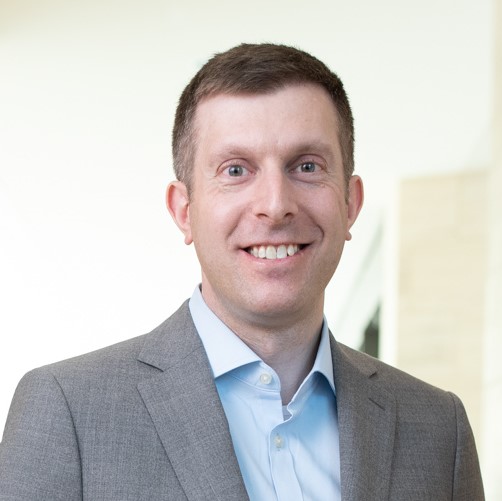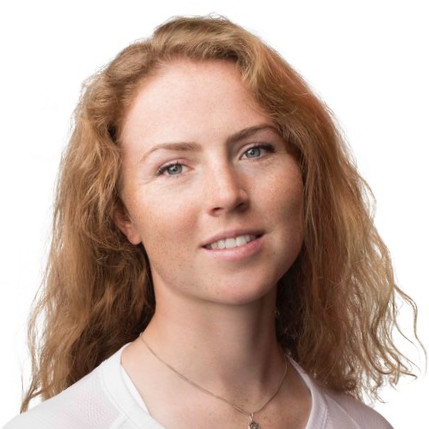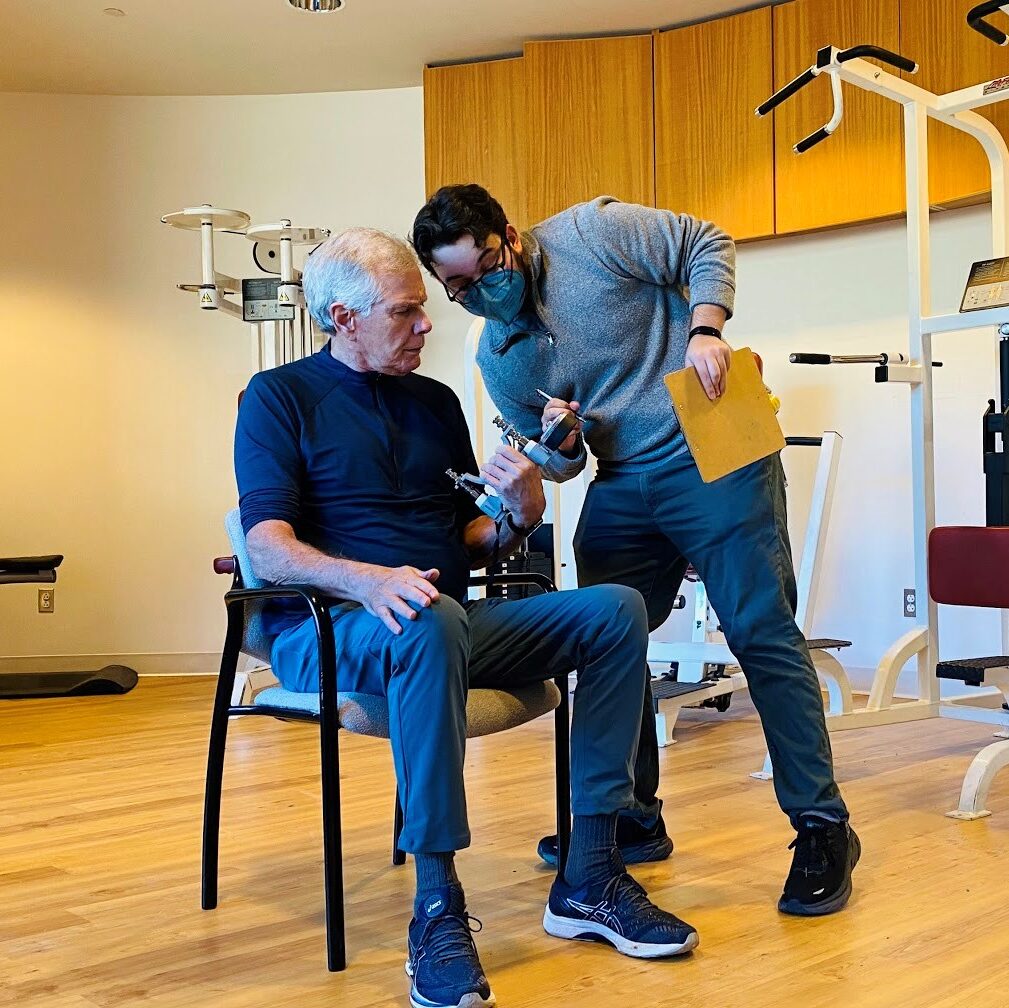by Buck Institute
September 11, 2023 . News
The Buck gets $3.5 million to conduct the first-ever clinical trial of ketone supplementation to treat and or prevent frailty
NIH grant funds TAKEOFF, a multi-site clinical trial to determine if putting at-risk older adults into ketosis can stave off a key aspect of geriatric syndrome
The Buck Institute for Research on Aging has received a $3.5 million federal grant to lead the first-ever double-blind, randomized, placebo-controlled clinical trial to understand the effects of ketone ester supplementation on frailty, a condition which develops following age-related decline in multiple physiological systems. TAKEOFF (Targeting Aging with Ketone Ester in Older Adults for Function in Frailty) will recruit a total of 180 people at the Buck, Ohio State University and the University of Connecticut Health Center.
 “TAKEOFF will be the biggest and most rigorous study of any ketone intervention in older adults,” said Buck assistant professor John Newman, MD, PhD, who is the principal investigator on the grant. “We are very excited to test this approach in a human population that is at risk for becoming frail, a condition which increases the risks of all sorts of serious problems in older adults from falls and life-threatening infections to becoming disabled and losing independence after surgery.” Newman added, “If TAKEOFF proves the biology, it should open the door for interventions for other conditions of aging that share similar mechanisms.”
“TAKEOFF will be the biggest and most rigorous study of any ketone intervention in older adults,” said Buck assistant professor John Newman, MD, PhD, who is the principal investigator on the grant. “We are very excited to test this approach in a human population that is at risk for becoming frail, a condition which increases the risks of all sorts of serious problems in older adults from falls and life-threatening infections to becoming disabled and losing independence after surgery.” Newman added, “If TAKEOFF proves the biology, it should open the door for interventions for other conditions of aging that share similar mechanisms.”
Noting the overall interest and excitement about ketogenic diets and ketogenic supplementation in the general population, Newman points out that human data on the effects of both the diet and supplementation in older adults is mostly anecdotal and very limited. “Putting aging mice on a ketogenic diet dramatically improves muscle fitness and brain health, but mice are not people, we need to see if the science holds up in people,” said Newman who is also a practicing geriatrician at the San Francisco Veterans Affairs Health Care System.
Ketones, naturally occurring compounds, increase when the availability of dietary carbohydrates (sugars in various forms) are limited forcing the body to use fat instead of sugar for energy. Various forms of fasting and the popular high-fat, moderate-protein, and low-carbohydrate ketogenic diet can put people into ketosis. Both have been linked to several health benefits, including weight loss, a reversal of metabolic syndrome and reduced inflammation. The supplement used in the trial is designed to put people into ketosis without having to change their diet.
The Buck’s BIKE trial was the pilot for TAKEOFF
The BIKE (Buck Institute Ketone Ester) pilot study was the first trial in the world to look at the effects of ketone ester supplementation in the context of aging. Thirty healthy individuals over the age of 65 have taken part in a 12-week double-blind, randomized, placebo-controlled study to begin to see whether benefits of ketone bodies in aging that have been observed in mice translate to human beings. The final participants in BIKE are expected to finish the protocol in late 2023; results of the study will be released in 2024.
 While BIKE involves older adults in stable health, TAKEOFF will recruit adults who are pre-frail, based on their walking speed. A decrease in normal walking speed is one of the precursors of frailty and is associated with increased risk for a variety of geriatric problems. TAKEOFF co-investigator, Brianna Stubbs, PhD, says TAKEOFF has a different primary outcome as well. “We will be looking at people’s muscle strength on a leg press over the course of the study. In BIKE we are primarily interested in safety and tolerance. While we’re still interested in those measures in TAKEOFF, we’re focused on leg press strength because strength is one of the key signs of frailty and we expect that ketosis may improve muscle strength by acting on energy and inflammation.”
While BIKE involves older adults in stable health, TAKEOFF will recruit adults who are pre-frail, based on their walking speed. A decrease in normal walking speed is one of the precursors of frailty and is associated with increased risk for a variety of geriatric problems. TAKEOFF co-investigator, Brianna Stubbs, PhD, says TAKEOFF has a different primary outcome as well. “We will be looking at people’s muscle strength on a leg press over the course of the study. In BIKE we are primarily interested in safety and tolerance. While we’re still interested in those measures in TAKEOFF, we’re focused on leg press strength because strength is one of the key signs of frailty and we expect that ketosis may improve muscle strength by acting on energy and inflammation.”
Collaborators at Ohio State University, led by Jeff Volek, PhD, will be looking in detail at muscle function and metabolism among participants. Scientists at UConn Health Center, led by Jenna Bartley, PhD will take a deep dive into immune responses with a particular interest in immunosenescence and chronic inflammation. The Buck will be looking closely at changes in various blood biomarkers of aging during the course of the trial.
“It’s crucial that we look at the impact of this intervention from several angles because there are so many possible applications of ketone biology for older adults,” said Newman. “If the science works in people, that’s direct evidence that we should be developing ketone-based interventions for other conditions of aging that share similar mechanisms like energy loss and chronic inflammation. This could involve everything from Alzheimer’s to heart disease.”
A shout out to the donor who got the ball rolling—and kudos from our local congressman
 Stubbs, who is the Buck’s Lead Translational Scientist, emphasized the impact that retired physician Jim Johnson has had on the overall effort to launch a clinical research program at the Buck. Johnson donated $250,000 to get the BIKE pilot study off of the ground, enabling the Buck to work out logistics, refine protocols and hire staff. “We’re working hard to grow that seed into a world-class translational geroscience center right here in Novato, at Buck,”, said Stubbs. Johnson also pitched in personally to help clinical staff practice and refine their protocols before participants came to the Buck for their first appointments.
Stubbs, who is the Buck’s Lead Translational Scientist, emphasized the impact that retired physician Jim Johnson has had on the overall effort to launch a clinical research program at the Buck. Johnson donated $250,000 to get the BIKE pilot study off of the ground, enabling the Buck to work out logistics, refine protocols and hire staff. “We’re working hard to grow that seed into a world-class translational geroscience center right here in Novato, at Buck,”, said Stubbs. Johnson also pitched in personally to help clinical staff practice and refine their protocols before participants came to the Buck for their first appointments.
U.S. Congressman Jared Huffman, who represents California’s 2nd district took note of the importance of the grant award, “Investing in America includes investing in the health of aging Americans. In order to advance modern medicine, we should expand research to determine ways to reduce costs and extend quality of life for our aging populations,” said Rep. Huffman. “I’m glad to see money I helped secure coming to valued institutions in my district. With this funding, the Buck Institute will be able to conduct groundbreaking new scientific studies to improve the quality and potentially the longevity of human life.”
Recruitment for TAKEOFF will begin in 2024
Recruitment for all three TAKEOFF clinical sites will be handled by the UCSF-affiliated San Francisco Coordinating Center, which specializes in coordinating multi-site trials of older adults. In order to guarantee diversity among participants, the Buck will be focused on recruiting older adults with Hispanic backgrounds as part of its outreach in Marin and Sonoma counties.
“BIKE has been incredibly successful, it’s gone smoothly and efficiently,” said Stubbs, who manages the trial. “The response of the community to the trial has just bowled us over. There’s been so much enthusiasm. We literally had 10 times more people express interest than we could enroll. We’ve met some delightful people and it makes us feel really good about doing more studies. We look forward to engaging with our community via TAKEOFF.”
The response of the community to the trial has just bowled us over. There’s been so much enthusiasm. We literally had 10 times more people express interest than we could enroll.
TAKEOFF is designed to help move translational research forward
TAKEOFF’s protocols and outcome measures are designed to be compatible with other trials involved with the Geroscience Translational Network, an NIH-funded collaboration of researchers testing clinical interventions that target fundamental mechanisms of aging to address aging-related problems as a group, instead of one at a time. Dr. Newman co-leads the sibling Geroscience Education and Training Network that is developing programs to train investigators to carry out such clinical trials.
The Network’s efforts to standardize outcome measurements was spurred by designing the TAME (Targeting Aging with Metformin) trial, which would aim to see whether taking the popular diabetes drug metformin can delay development of age-related chronic diseases in older adults without diabetes. “There is such an explosion of interest in testing interventions that could impact aging that it became obvious that we need to be able to compare apples-to-apples when it comes to trial results,” said Newman. “The design of TAME has inspired a constellation of smaller studies in both industry and academia testing a whole variety of interventions from metformin and rapamycin to senolytics. We really look forward to Buck becoming a key node in these efforts, helping to accelerate getting the biology of aging out of the laboratory and into the clinic.”
TAKEOFF and the Buck’s pledge to the public
If TAKEOFF is successful at proving that ketone supplementation impacts hallmarks of aging, both Newman and Stubbs predict there will be an uptick in efforts to get FDA-approved targeted interventions for specific diseases of aging based on ketone biology into the clinic. But they also acknowledge that ketone supplementation will continue to be of major interest to those interested in maintaining good health as they age.
“At the Buck we want to use evidence-based reasoning to inform the decisions that people make about what they’re going to do for their own health,” said Stubbs. “The supplement and diet industries can be muddy, with lots of questionable claims based sometimes on no data, and so, hopefully, the results of both BIKE and TAKEOFF will allow people to make wise decisions about what they’re going to do with their own diet and supplement kind of regimes. That’s a role we’re happy to play for the public.”
DISCLOSURE: Dr. John Newman, Principal Investigator for the TAKEOFF study, and Dr. Brianna Stubbs, a study co-investigator, own stock in BHB Therapeutics, LTD, the company providing the product being studied, and are inventors on patents that relate to the product being studied. The Buck Institute also has an ownership interest in BHB Therapeutics.
Acknowledgement: TAKEOFF is being funded by NIH grant R01AG081226
Science is showing that while chronological aging is inevitable, biological aging is malleable. There's a part of it that you can fight, and we are getting closer and closer to winning that fight.
Eric Verdin, MD, Buck Institute President and CEO